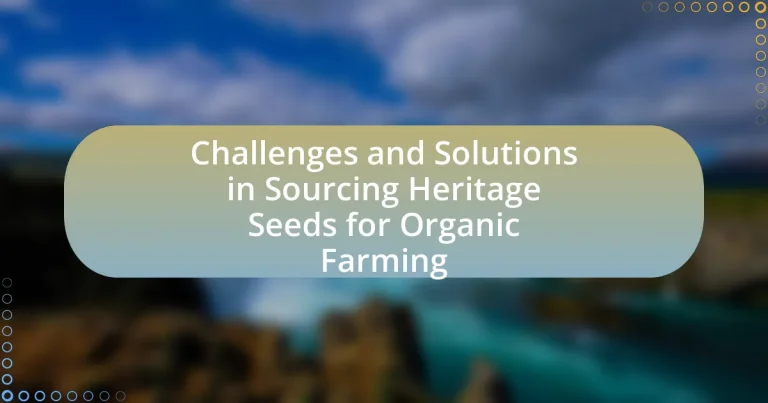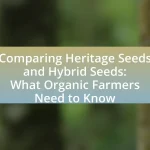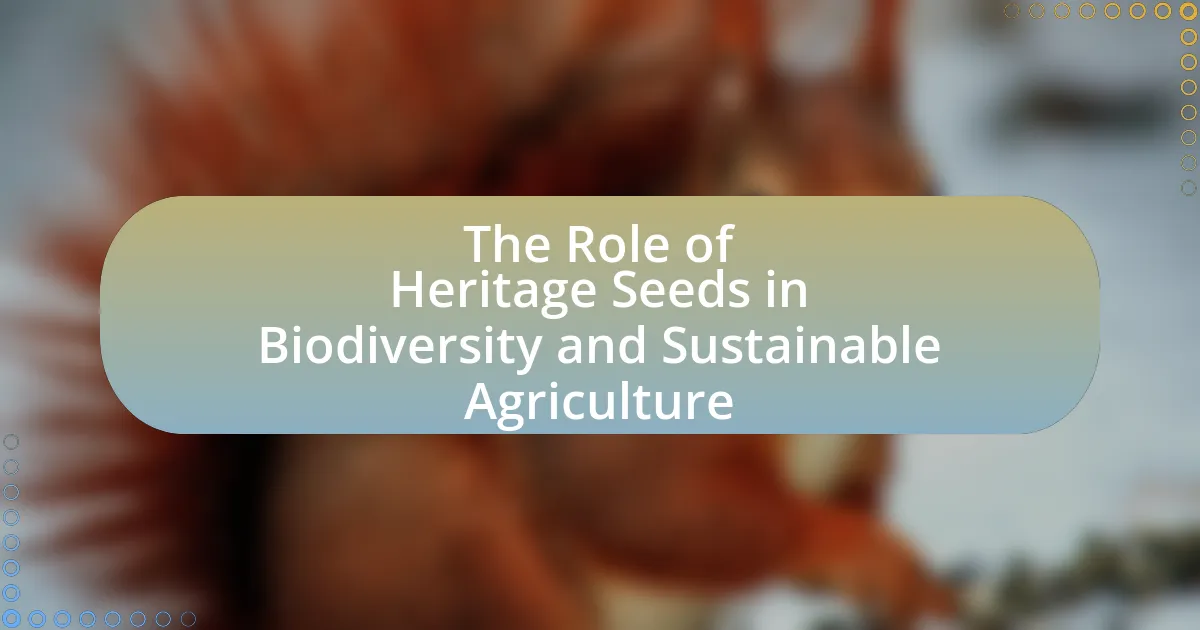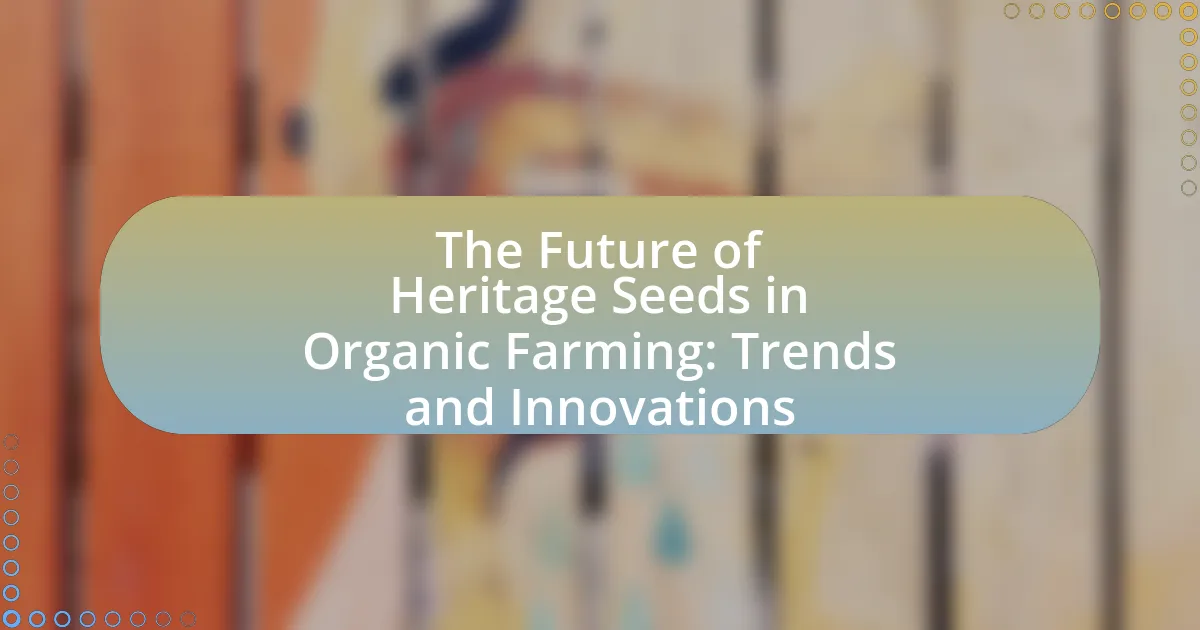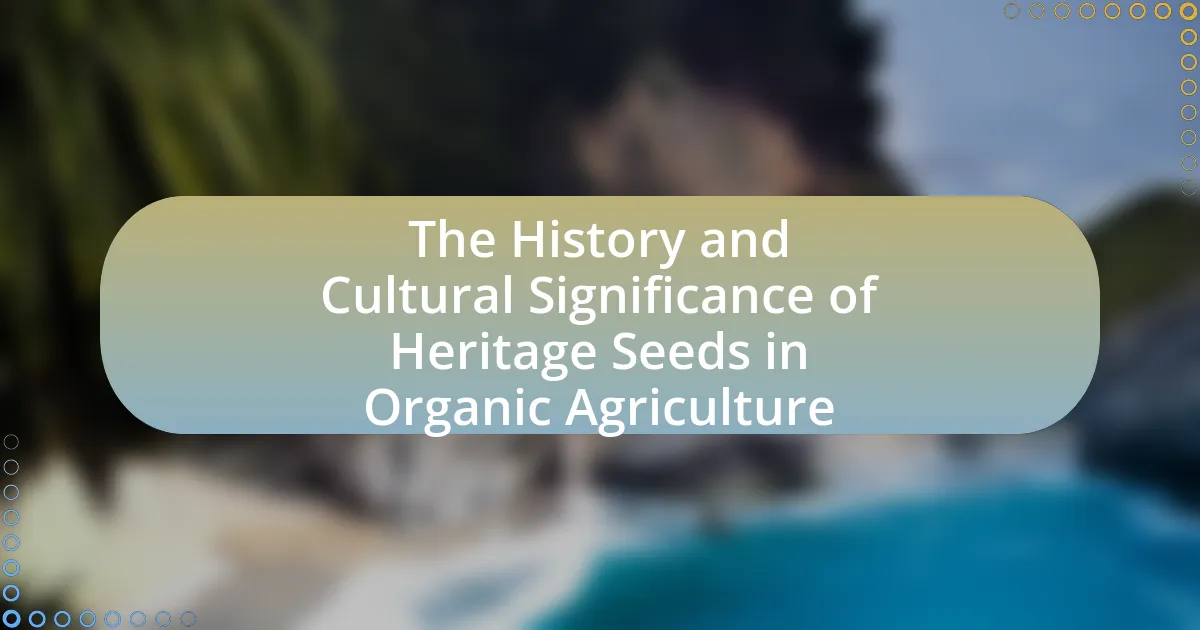The article focuses on the challenges and solutions associated with sourcing heritage seeds for organic farming. Key challenges include limited availability, loss of genetic diversity, and regulatory hurdles that restrict access to these essential seeds. The article highlights the importance of heritage seeds for maintaining biodiversity and traditional agricultural practices, while also addressing quality issues, common diseases, and pests that affect these varieties. Additionally, it discusses the role of seed banks, community initiatives, and policy changes in enhancing access to heritage seeds, as well as best practices for farmers in selecting and sourcing these vital resources.
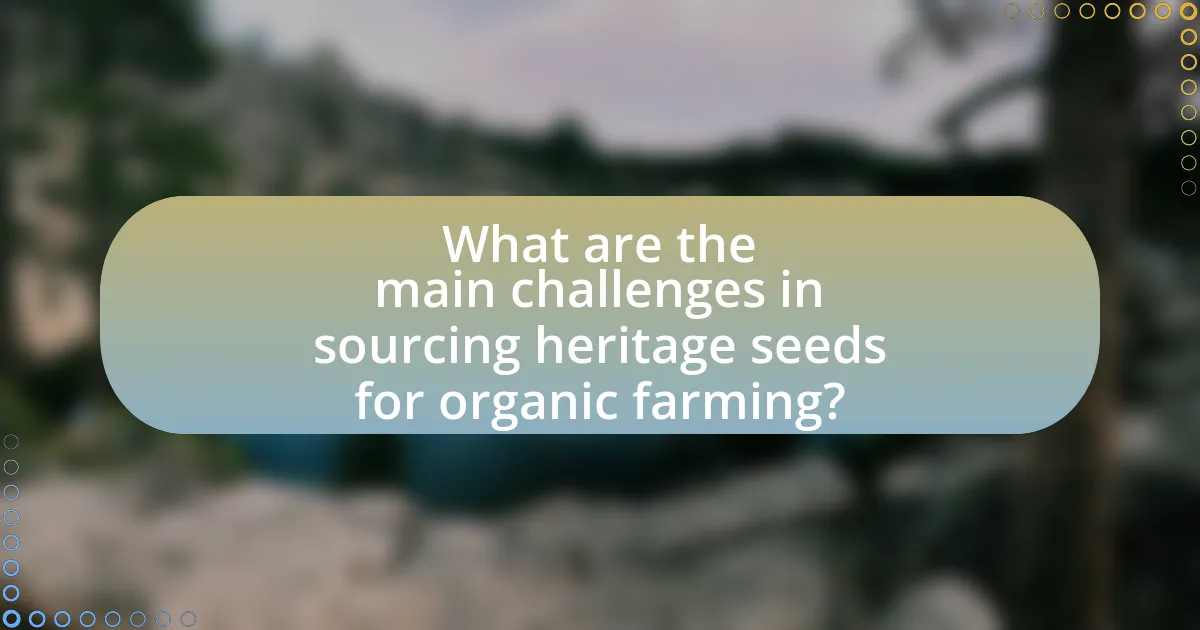
What are the main challenges in sourcing heritage seeds for organic farming?
The main challenges in sourcing heritage seeds for organic farming include limited availability, genetic diversity loss, and regulatory hurdles. Limited availability arises because many heritage seed varieties are not commercially produced, making them difficult to find. Genetic diversity loss occurs as modern agricultural practices favor hybrid and genetically modified seeds, leading to a decline in traditional varieties. Regulatory hurdles involve stringent certification processes for organic seeds, which can complicate the sourcing of heritage seeds that may not meet specific organic standards. These challenges hinder farmers’ ability to access and cultivate diverse, resilient crops essential for sustainable organic farming.
Why is the availability of heritage seeds a concern for organic farmers?
The availability of heritage seeds is a concern for organic farmers because these seeds are essential for maintaining biodiversity and preserving traditional agricultural practices. Organic farmers rely on heritage seeds to cultivate crops that are well-adapted to local conditions and resistant to pests and diseases. However, the increasing dominance of commercial seed varieties, which often lack genetic diversity, threatens the availability of these heritage seeds. According to a report by the Seed Savers Exchange, over 90% of seed varieties have been lost in the last century, highlighting the urgent need for organic farmers to secure access to heritage seeds to ensure sustainable farming practices and food security.
What factors contribute to the scarcity of heritage seeds?
The scarcity of heritage seeds is primarily due to industrial agriculture practices, loss of biodiversity, and market demand for uniformity. Industrial agriculture often prioritizes high-yield, genetically modified crops, leading to the neglect and eventual extinction of diverse heritage varieties. This loss of biodiversity is compounded by the consolidation of seed companies, which reduces the availability of heritage seeds in the market. Additionally, consumer preferences for standardized produce further diminish the demand for heritage seeds, making them less accessible to farmers. According to the Food and Agriculture Organization, approximately 75% of crop diversity has been lost since the 1900s, highlighting the critical decline in heritage seed availability.
How do regulations impact the sourcing of heritage seeds?
Regulations significantly impact the sourcing of heritage seeds by establishing legal frameworks that govern their use, distribution, and preservation. These regulations often require seed producers to adhere to specific standards for seed quality and genetic purity, which can limit the availability of certain heritage varieties. For instance, in many countries, heritage seeds may not be eligible for certification under organic standards if they do not meet specific criteria set by regulatory bodies, thereby restricting farmers’ access to these seeds. Additionally, intellectual property laws, such as plant variety protection, can hinder the sharing and exchange of heritage seeds among farmers, as these laws may favor commercial seed varieties over traditional ones. Consequently, the regulatory landscape plays a crucial role in determining the accessibility and sustainability of heritage seed sourcing for organic farming.
What are the quality issues associated with heritage seeds?
Heritage seeds often face quality issues such as reduced germination rates, susceptibility to diseases, and inconsistent plant characteristics. These problems arise because heritage seeds are typically open-pollinated and may not have undergone the rigorous selection processes that modern hybrids have, leading to variability in traits like yield and resilience. Research indicates that some heritage varieties may also lack the vigor needed to thrive in certain environmental conditions, which can further impact their performance in organic farming systems.
How does seed quality affect crop yield and health?
Seed quality directly influences crop yield and health by determining germination rates, disease resistance, and overall plant vigor. High-quality seeds typically exhibit better germination rates, which can lead to more uniform plant stands and higher yields. For instance, research indicates that seeds with high genetic purity and vigor can increase crop yields by 10-20% compared to lower-quality seeds. Additionally, healthy seeds are more resilient to pests and diseases, reducing the need for chemical interventions and promoting sustainable farming practices. Studies have shown that using certified seeds can significantly enhance crop health, leading to improved nutritional quality and reduced crop losses.
What are the common diseases and pests affecting heritage seeds?
Common diseases affecting heritage seeds include powdery mildew, blight, and root rot, while common pests include aphids, beetles, and nematodes. Powdery mildew is a fungal disease that thrives in warm, dry conditions, often impacting crops like squash and cucumbers. Blight, particularly late blight, can devastate potato and tomato plants, leading to significant yield loss. Root rot, caused by various pathogens, affects the root systems of many plants, leading to stunted growth and plant death.
Aphids are small sap-sucking insects that can transmit viruses and weaken plants, while beetles, such as the Colorado potato beetle, can cause extensive damage to crops. Nematodes are microscopic worms that attack plant roots, leading to reduced nutrient uptake and overall plant health. These diseases and pests pose significant challenges to the cultivation of heritage seeds, which are often less resistant to such threats compared to modern hybrids.
How does the lack of knowledge affect sourcing heritage seeds?
The lack of knowledge significantly hinders the sourcing of heritage seeds by limiting farmers’ ability to identify, evaluate, and select appropriate varieties for their specific agricultural needs. Without adequate understanding of the genetic diversity, historical significance, and cultivation requirements of heritage seeds, farmers may struggle to access seeds that are well-suited to their local environments and resistant to pests and diseases. Research indicates that heritage seeds often possess unique traits that can enhance biodiversity and resilience in farming systems, yet this potential remains untapped when knowledge gaps exist. For instance, a study by the Seed Savers Exchange highlights that farmers who lack information about seed saving techniques and the benefits of heritage varieties are less likely to incorporate these seeds into their practices, thereby diminishing the overall availability and use of heritage seeds in organic farming.
What educational resources are available for farmers regarding heritage seeds?
Farmers can access various educational resources regarding heritage seeds through agricultural extension services, online platforms, and community organizations. Agricultural extension services often provide workshops, seminars, and printed materials that cover the benefits and cultivation techniques of heritage seeds. Online platforms, such as the Seed Savers Exchange and the USDA’s National Plant Germplasm System, offer databases, guides, and forums for farmers to learn about heritage seed varieties and their preservation. Community organizations, including local seed libraries and non-profits focused on sustainable agriculture, frequently host events and provide resources to educate farmers on sourcing and utilizing heritage seeds effectively.
How can farmers share knowledge about heritage seed sourcing?
Farmers can share knowledge about heritage seed sourcing through community seed banks, workshops, and online platforms. Community seed banks allow farmers to exchange seeds and information about sourcing, while workshops provide hands-on learning experiences about cultivation and preservation techniques. Online platforms, such as social media groups and dedicated forums, facilitate broader discussions and resource sharing among farmers, enhancing their collective knowledge. These methods have been shown to increase awareness and accessibility of heritage seeds, as evidenced by initiatives like the Seed Savers Exchange, which has successfully connected thousands of farmers since its inception in 1975.
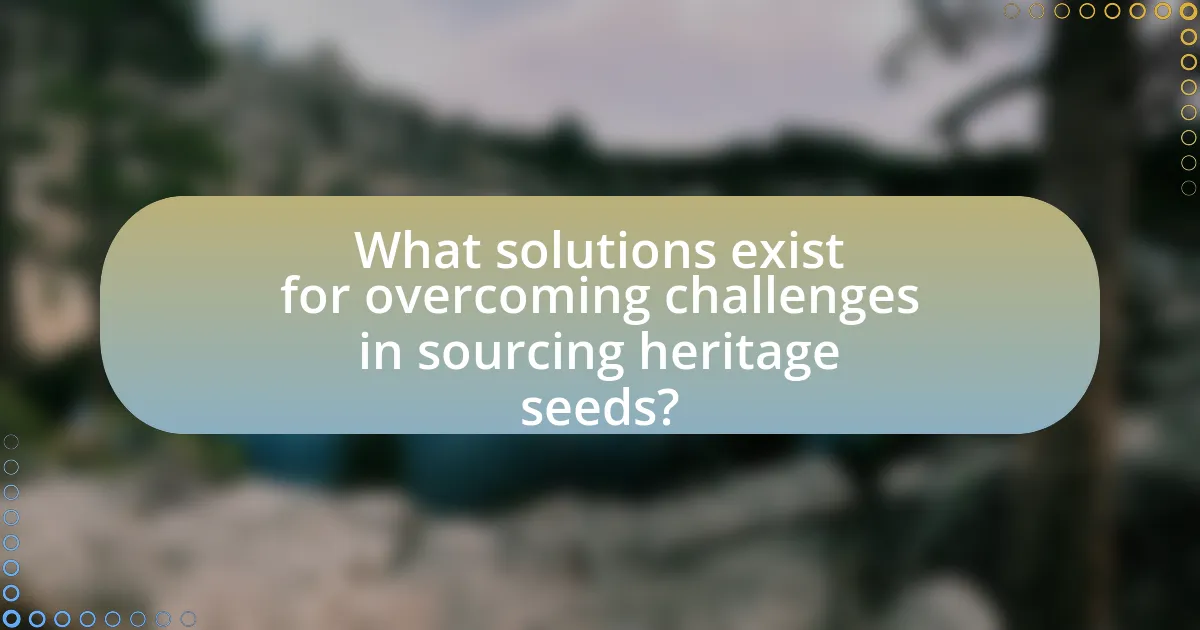
What solutions exist for overcoming challenges in sourcing heritage seeds?
Solutions for overcoming challenges in sourcing heritage seeds include establishing seed banks, promoting community seed exchanges, and implementing legal frameworks that protect seed diversity. Seed banks, such as the Svalbard Global Seed Vault, preserve genetic material and provide access to a wide variety of heritage seeds, ensuring their availability for future generations. Community seed exchanges foster local networks where farmers can share and trade seeds, enhancing biodiversity and resilience in local agriculture. Additionally, legal frameworks, like the International Treaty on Plant Genetic Resources for Food and Agriculture, support the conservation and sustainable use of heritage seeds, providing a structured approach to protect these vital resources.
How can farmers collaborate to improve access to heritage seeds?
Farmers can collaborate to improve access to heritage seeds by forming seed-sharing networks and cooperatives. These networks enable farmers to exchange seeds, knowledge, and resources, thereby increasing the availability of diverse heritage varieties. For instance, the Seed Savers Exchange, a well-known organization, facilitates the sharing of heirloom seeds among farmers, promoting biodiversity and preserving traditional crops. Additionally, farmers can participate in community seed banks, which store and distribute heritage seeds, ensuring that these varieties remain accessible for future planting. Collaborative efforts like these not only enhance seed access but also strengthen local agricultural resilience and sustainability.
What role do seed banks play in preserving heritage seeds?
Seed banks play a crucial role in preserving heritage seeds by collecting, storing, and maintaining genetic diversity of traditional plant varieties. These institutions safeguard seeds from extinction due to factors like climate change, urbanization, and industrial agriculture practices. For example, the Svalbard Global Seed Vault, established in 2008, houses over a million seed samples from around the world, ensuring that heritage seeds remain available for future generations. By providing a repository for these seeds, seed banks facilitate research, breeding programs, and the restoration of lost varieties, thereby supporting biodiversity and sustainable agriculture.
How can community-supported agriculture (CSA) initiatives help?
Community-supported agriculture (CSA) initiatives help by creating a direct connection between consumers and local farmers, which enhances access to fresh, organic produce. This model supports farmers financially at the beginning of the growing season, allowing them to invest in heritage seeds and sustainable farming practices. According to a study published in the Journal of Agriculture, Food Systems, and Community Development, CSAs can increase the availability of diverse crops, including heritage varieties, by providing farmers with the necessary resources to cultivate them. This not only promotes biodiversity but also strengthens local food systems and encourages community engagement in sustainable agriculture.
What technological advancements can aid in sourcing heritage seeds?
Technological advancements such as DNA barcoding, seed banks, and digital platforms can significantly aid in sourcing heritage seeds. DNA barcoding allows for the precise identification of seed varieties, ensuring that farmers can access authentic heritage seeds. Seed banks preserve genetic diversity and provide a repository for heritage seeds, making them accessible for future cultivation. Additionally, digital platforms facilitate the exchange of information and seeds among farmers, enhancing collaboration and access to diverse seed varieties. These advancements collectively support the conservation and sourcing of heritage seeds, vital for maintaining agricultural biodiversity.
How can online platforms facilitate the exchange of heritage seeds?
Online platforms can facilitate the exchange of heritage seeds by providing a digital marketplace that connects seed savers and growers directly. These platforms enable users to list, search, and trade seeds, thereby increasing accessibility and diversity of heritage varieties. For instance, platforms like Seed Savers Exchange have successfully created networks where individuals can share their unique seed varieties, fostering community engagement and preserving biodiversity. Additionally, online platforms often include educational resources about seed saving and cultivation practices, which further supports users in maintaining and exchanging heritage seeds effectively.
What innovations in seed preservation are being developed?
Innovations in seed preservation include cryopreservation, which involves storing seeds at extremely low temperatures to maintain viability for extended periods. This method has been shown to effectively preserve genetic diversity and enhance the longevity of seeds, as evidenced by research conducted by the International Plant Genetic Resources Institute, which demonstrated that seeds stored at -196°C can remain viable for decades. Additionally, advances in desiccation techniques are being developed to reduce moisture content in seeds, further extending their shelf life. These innovations are crucial for maintaining heritage seed varieties in organic farming, ensuring their availability for future generations.
How can policy changes support heritage seed sourcing?
Policy changes can support heritage seed sourcing by implementing regulations that protect and promote the use of traditional seed varieties. Such regulations can include legal frameworks that safeguard the intellectual property rights of farmers who cultivate heritage seeds, ensuring they are not penalized for using these varieties. Additionally, policies can provide financial incentives, such as grants or subsidies, to farmers who choose to grow and maintain heritage seeds, thereby encouraging biodiversity and sustainable agricultural practices. For instance, the European Union’s Common Agricultural Policy has provisions that support agri-environmental schemes, which can be leveraged to promote heritage seed cultivation. These policy measures not only enhance the availability of heritage seeds but also contribute to the preservation of agricultural biodiversity, which is crucial for food security and resilience against climate change.
What advocacy efforts are underway to protect heritage seed rights?
Advocacy efforts to protect heritage seed rights include initiatives by organizations such as the Seed Savers Exchange and the Alliance for Food Sovereignty in Africa, which work to promote legal frameworks that recognize and safeguard traditional seed varieties. These organizations engage in lobbying for policies that prevent the patenting of heritage seeds, ensuring farmers retain the right to save, share, and sell these seeds. Additionally, grassroots movements are raising awareness about the importance of biodiversity and food sovereignty, emphasizing the cultural and ecological significance of heritage seeds. These efforts are supported by research indicating that preserving heritage seeds contributes to agricultural resilience and sustainability.
How can government programs assist organic farmers in sourcing heritage seeds?
Government programs can assist organic farmers in sourcing heritage seeds by providing funding, technical support, and access to seed banks. These programs often allocate grants specifically for the preservation and distribution of heritage seeds, enabling farmers to obtain diverse seed varieties that are crucial for maintaining biodiversity. For instance, the USDA’s Agricultural Marketing Service has initiatives that promote the use of heritage seeds, which helps farmers access these resources more easily. Additionally, government programs may facilitate partnerships between farmers and seed conservation organizations, enhancing the availability of heritage seeds and ensuring that organic farmers can cultivate traditional varieties that are well-suited to their local environments.
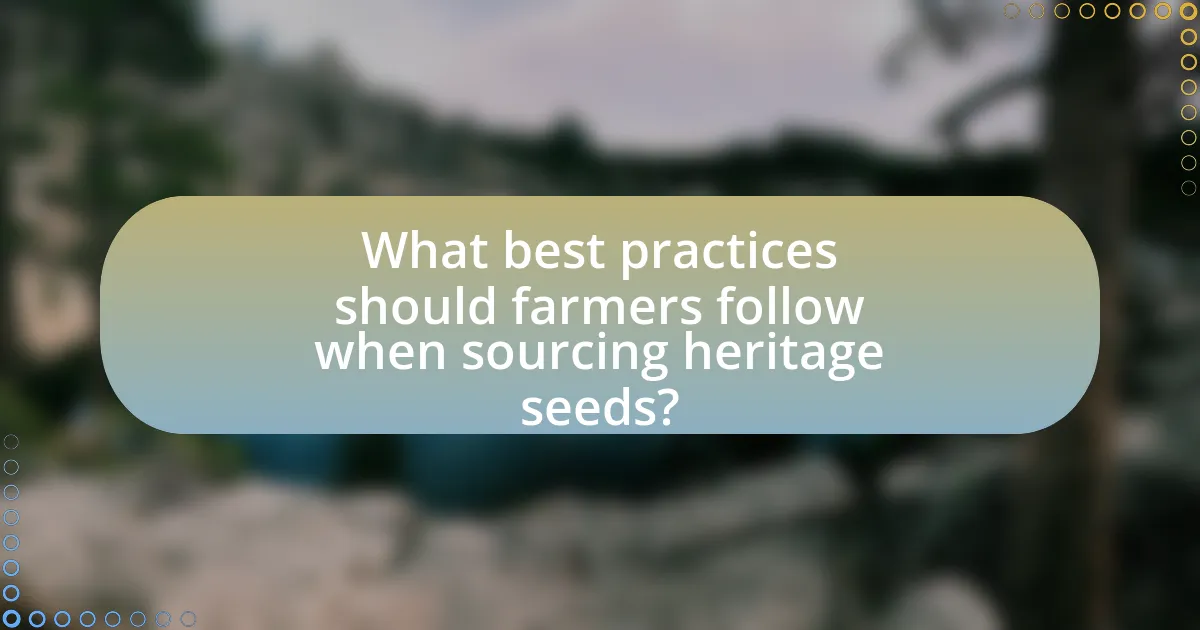
What best practices should farmers follow when sourcing heritage seeds?
Farmers should prioritize sourcing heritage seeds from reputable suppliers who specialize in organic and heirloom varieties. This ensures the seeds are authentic and have been maintained without genetic modification. Additionally, farmers should conduct thorough research on the seed varieties that are best suited for their local climate and soil conditions, as this can significantly impact crop yield and resilience. Engaging with local agricultural extension services or seed banks can provide valuable insights and access to regionally adapted heritage seeds. Furthermore, farmers should consider participating in seed saving practices to preserve genetic diversity and ensure a sustainable supply of heritage seeds for future planting.
How can farmers effectively network with heritage seed suppliers?
Farmers can effectively network with heritage seed suppliers by participating in local agricultural fairs, seed swaps, and community gardening events. These venues provide opportunities for farmers to meet suppliers face-to-face, exchange knowledge, and establish relationships. Additionally, joining organizations focused on organic farming and heritage seeds, such as the Seed Savers Exchange, can facilitate connections with suppliers who specialize in these seeds. Research indicates that direct engagement in community-based events enhances trust and collaboration, which are crucial for sourcing heritage seeds effectively.
What strategies can be employed to build relationships with seed producers?
To build relationships with seed producers, effective strategies include establishing clear communication, demonstrating mutual benefits, and engaging in collaborative projects. Clear communication fosters trust and understanding, allowing both parties to align their goals and expectations. Demonstrating mutual benefits, such as sharing market insights or providing feedback on seed performance, encourages seed producers to invest in the relationship. Engaging in collaborative projects, like joint research or community seed-saving initiatives, strengthens ties and showcases commitment to sustainable practices. These strategies are supported by the fact that successful partnerships in agriculture often rely on open dialogue and shared objectives, as evidenced by numerous case studies in cooperative farming initiatives.
How can farmers participate in seed exchanges and fairs?
Farmers can participate in seed exchanges and fairs by registering for events organized by agricultural cooperatives, local gardening clubs, or community organizations that focus on sustainable agriculture. These events typically allow farmers to bring their own seeds to trade, share knowledge about heritage varieties, and network with other growers. For instance, the Seed Savers Exchange hosts annual events where farmers can exchange seeds and learn about organic farming practices, promoting biodiversity and preserving heritage seeds.
What are the key considerations for selecting heritage seeds?
Key considerations for selecting heritage seeds include genetic diversity, adaptability to local conditions, and historical significance. Genetic diversity ensures resilience against pests and diseases, which is crucial for sustainable farming. Adaptability to local conditions allows for better growth and yield, as heritage seeds are often well-suited to specific climates and soils. Historical significance reflects the cultural and agricultural heritage, preserving traditional farming practices. These factors collectively contribute to the sustainability and productivity of organic farming systems.
How can farmers assess the suitability of heritage seeds for their specific environment?
Farmers can assess the suitability of heritage seeds for their specific environment by conducting soil tests, evaluating local climate conditions, and analyzing historical crop performance data. Soil tests provide information on nutrient levels, pH, and organic matter, which are crucial for determining which heritage seeds will thrive. Local climate conditions, such as temperature, rainfall, and frost dates, influence seed performance; thus, farmers should select seeds that have adapted to similar environments historically. Additionally, analyzing historical crop performance data helps farmers understand which heritage varieties have succeeded in their area, providing a practical basis for selection.
What factors should be evaluated when choosing between different heritage seed varieties?
When choosing between different heritage seed varieties, factors such as climate adaptability, disease resistance, yield potential, and flavor profile should be evaluated. Climate adaptability ensures that the seeds can thrive in specific environmental conditions, which is crucial for successful cultivation. Disease resistance is important to minimize crop loss and reduce the need for chemical interventions, thereby supporting organic farming practices. Yield potential indicates the expected productivity of the variety, which directly impacts food supply and economic viability. Flavor profile is essential for marketability and consumer preference, as heritage varieties often offer unique tastes that can differentiate products in the marketplace. These factors collectively influence the overall success of organic farming initiatives using heritage seeds.
What practical tips can enhance the success of sourcing heritage seeds?
To enhance the success of sourcing heritage seeds, prioritize establishing relationships with reputable seed banks and local farmers who specialize in heritage varieties. These connections provide access to a diverse range of seeds and valuable knowledge about their cultivation. Additionally, participating in seed swaps and community gardening events can facilitate the exchange of heritage seeds, promoting genetic diversity and resilience. Research indicates that heritage seeds often adapt better to local conditions, as evidenced by studies showing improved yields in heirloom varieties compared to commercial hybrids in specific regions.
How can farmers document and share their experiences with heritage seeds?
Farmers can document and share their experiences with heritage seeds by utilizing digital platforms, community workshops, and agricultural journals. Digital platforms, such as social media and dedicated farming forums, allow farmers to post updates, photos, and videos of their cultivation processes, fostering a community of knowledge exchange. Community workshops enable farmers to gather and discuss their experiences, share best practices, and learn from one another in person. Agricultural journals provide a formal avenue for documenting detailed accounts of seed performance, challenges faced, and successful techniques, contributing to a broader understanding of heritage seed cultivation. These methods not only preserve individual experiences but also create a collective resource for future generations of farmers.
What resources are available for ongoing education about heritage seed sourcing?
Resources available for ongoing education about heritage seed sourcing include online courses, workshops, and community-supported agriculture programs. Organizations such as Seed Savers Exchange and the Organic Seed Alliance offer educational materials, webinars, and hands-on training focused on heritage seed preservation and sourcing. Additionally, universities and agricultural extension services provide research-based resources and publications that cover best practices in heritage seed sourcing. These resources are validated by their contributions to sustainable agriculture and biodiversity conservation, as evidenced by studies highlighting the importance of heritage seeds in maintaining genetic diversity in crops.
